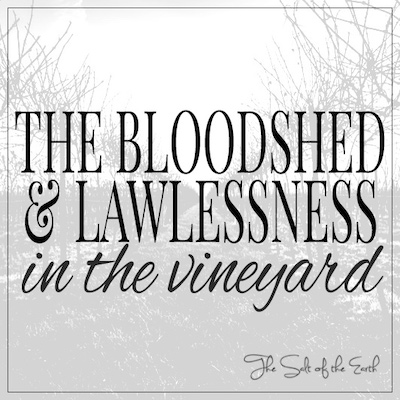There are many Christians, who call themselves prophets and are appointed in the office of prophet. Tomēr, not all of these prophets are appointed by God. Not all of them are true prophets, who listen to God and speak the words of God. Many of them are false prophets, who speak their own words and lying divination. There have always been false prophets and there will always be false prophets. Jesus and the apostles warned the believers about false prophets. How do you recognize and identify false prophets in our time? What does the Bible say about false prophets and the characteristics of a false prophet?
The prophets in the Old Testament
I have not sent these prophets, yet they ran: I have not spoken to them, yet they prophesied. But if they had stood in My counsel, and had caused My people to hear My words, then they should have turned them from their evil way, and from the evil of their doings (Jeremiah 23:21-22)
A prophet of God is not always loved, because a prophet often speaks corrective words for the edification and protection of the church (the assembly of believers, who are born again and belong to God).
When we look at the prophets in the Old Testament, they often had a difficult task to fulfill. The prophets in the Old Testament were not always loved and appreciated by the people. They were only loved and appreciated when the people were in trouble, oppressed, and needed advice. When the people needed help, they went to the prophets and inquired the prophets and asked them for counsel.
The prophets of God were not always learned men. But they were always men and women, who lived after the will of God.
They had not chosen themselves to become a prophet. But God had chosen them to speak His words in His name to His people.
Take for example Amos and Elisha. They were farmers, when they were called by God (1 Kings 19:19, Amos 7:14).
God was not looking for learned, skilled, strong, and handsome men. Nor was God looking for charismatic eloquent speakers. But God was looking for people, who were completely devoted to God.
God didn’t look at the (outward) appearance, but He looked at the heart of a person.
God looked for devoted people with devoted hearts in whom He could show Himself strong. The only thing that the prophets had to do, was to open themselves to the Word of God, listen to Him, and obey Him by speaking His words to His people.
The false prophets in the Old Testament
In the Old Testament, there were many prophets but not every prophet prophesied by God. Daudzas reizes, false prophets entered, who said they were sent by God and pophesied in ‘the Name of the Lord’ . But in reality they prophesied according to their own visions, insights, knowledge, Domas, and what was in their hearts.
They spoke words, which didn’t originate from God but from themselves and lying spirits. Many prophets tried to please and win people for their own gain and to get a large following.
These false prophets used charismatic words and made wonderful promises to the people. By saying what the people wanted to hear, they gained the acceptance of the people. But because of their false prophecies (lies), they fooled the people and gave them false hope. Their prophecies caused the people to enter wicked ways, which caused a separation between God and His people.
Gada 400 prophets and their false prophecies
In 1 Kings 22 un 2 Chronicles 18, for example, we read about approximately 400 Pravieši, who all prophesied lies to the king. They prophesied, what the king wanted to hear. They were not completely devoted to God. Therefore a lying spirit could operate in them.
Ahab, the king of Israel, wanted to take Ramoth in Gilead, out of the hand of Aram, the king of Syria. He asked Jehoshaphat, the king of Judah, to battle with him to Ramoth.
But Jehoshaphat wanted to inquire the Lord first. Jehoshaphat wanted to hear what the Lord had to say about this matter.
Therefore King Ahab gathered the prophets of Israel, about 400 men.
The king asked the 400 prophets if he should go against Ramoth to battle or not.
All the 400 prophets answered that King Ahab should go up and that the Lord would deliver it into the hand of the king.
But Jehoshaphat was not convinced and asked the king if there wasn’t another prophet to inquire.
King Ahab answered Jehoshaphat that there was one other prophet, who they could inquire. His name was Micaiah. But King Ahab hated Micaiah because Micaiah never prophesied good concerning him but only evil. But the king called an officer to bring Micaiah to them.
While both kings were seated on their thrones, and the prophets prophesied before them, the messenger, who brought Micaiah, asked Micaiah to speak good to the king and say what the other prophets had said to the king. But Micaiah didn’t allow anyone to intimidate or influence him. And so Micaiah answered, As the Lord lives, what the Lord says unto me, that will I speak.
The lying spirit in the mouth of all King Ahab’s prophets
When Micaiah stood in front of the king and was asked if they would go up against Ramoth to battle or forbear, Micaiah answered and said, “Go, and prosper: for the Lord shall deliver it into the hand of the king.” The king said, “How many times shall I adjure thee that thou tell me nothing but that which is true in the name of the Lord?”
Then Micaiah said, “I saw all Israel scattered upon the hills, as sheep that have not a shepherd: and the Lord said, These have no master: let them return every man to his house in peace”
King Ahab said to Jehoshaphat, “Did I not tell thee that he would prophesy no good concerning me, but evil?”
Micaiah continued, Hear thou, therefore, the word of the Lord: I saw the Lord sitting on his throne, and all the host of heaven standing by him on his right hand and on his left. The Lord said, Who shall persuade Ahab, that he may go up and fall at Ramoth? And one said on this manner, and another said on that manner. There came forth a spirit, and stood before the Lord, and said, I will persuade him. The Lord said unto him, Wherewith? He said, I will go forth, and I will be a lying spirit in the mouth of all his prophets. He said, Thou shalt persuade him, and prevail also: go forth, and do so. Now therefore, lūk, the Lord hath put a lying spirit in the mouth of all these thy prophets, and the Lord hath spoken evil concerning thee”
But Zedekiah, the son of Chenaanah, was offended by the words of Micaiah. He approached Micaiah, smote Micaiah on the cheek, and said, “Which way went the Spirit of the Lord from me to speak unto thee?” Micaiah answered him: “Behold, thou shalt see in that day, when thou shalt go into an inner chamber to hide thyself”
The prophet Micaiah was put in prison
After the words of Micaiah, the king instructed his servants to put Micaiah in prison. He commanded them to give him bread and water of affliction until the king would return in peace.
King Ahab listened to the words of the 400 false prophets and went to battle. But before he went into battle, he disguised himself, so that he would be unrecognizable. He thought he could fool God. But God’s words shall always come to pass.
What God had spoken through the mouth of Micaiah came to pass. A certain man drew a bow at a venture and smote Ahab between the joints of his harness. That evening Ahab died and his blood ran out of his wound, into the midst of the chariot.
The next day the king was brought to Samaria, where they buried him. When the chariot was washed in the pool of Samaria, the dogs licked up his blood; and they washed his armor; according to the word of the Lord, which He spoke through the mouth of the prophet Elijah (1 Kings 19).
Micaiah didn’t speak positive words to gain the king’s approval and to please King Ahab. Because Micaiah didn’t fear King Ahab, but Micaiah feared God.
Micaiah did what the Lord commanded him to speak. He didn’t turn away from God’s words, not even a little bit. Not even, when he was taken captive and put in prison. Micaiah stayed faithful to God and His Word. He spoke what the Lord commanded him to speak.
God exposed the false prophets, who taught rebellion to the people
Jeremijā 28 un 29, Lamentations 2, and Ezekiel 22:28 (Cita starpā), God exposed the false prophets. The false prophets caused the people to rebel against the Word of God instead of correcting the people and making them aware of their iniquities and causing them to walk in the truth on the narrow path, which leads to eternal life.
Hananiah, the prophet, spoke wonderful, promising, uplifting, encouraging prophetic words to the people of God and the prophet Jeremiah. It all sounded so real, that even Jeremiah was under the assumption, that these encouraging words originated from God. Therefore Jeremiah confirmed his words by saying to Hananiah, that the words of the Lord, which he had spoken would indeed come to pass.
But when Jeremiah went his way, the word of the Lord came to Jeremiah.
The Lord confronted Jeremiah and said that He didn’t send Hananiah at all and that Hananiah made the people trust in a lie. Because of the fact, that Hananiah taught the people rebellion against God, the Lord said, that within a year, Hananiah would be cast from off the face of the earth.
The words of the Lord came to pass and Hananiah died in the seventh month of that same year.
Jeremijā 29, the Lord warned Jeremiah about the prophets, diviners, and those who dreamt dreams, to not be deceived by them. They prophesied in ‘the Name of the Lord’, while the Lord had not sent them at all!
God identified the false prophets and revealed the sins of the false prophets. The false prophets committed adultery, spoke lies in ‘the Name of the Lord’, and preached rebellion to the people of God. The Lord spoke through the mouth of Jeremiah:
Thus saith the Lord of hosts, the God of Israel, of Ahab the son of Kolaiah, and of Zedekiah the son of Maaseiah, which prophesy a lie unto you in my name; Redzi, I will deliver them into the hand of Nebuchadrezzar king of Babylon; and he shall slay them before your eyes; And of them shall be taken up a curse by all the captivity of Judah which are in Babylon, sakot, The Lord make thee like Zedekiah and like Ahab, whom the king of Babylon roasted in the fire; Because they have committed villany in Israel, and have committed adultery with their neighbours ‘wives, and have spoken lying words in My Name, which I have not commanded them; even I know, and am a witness, saka Tas Kungs (Jeremiah 29:21-23)
Then came the word of the Lord unto Jeremiah, sakot, Send to all them of the captivity, sakot, Thus saith the Lord concerning Shemaiah the Nehelamite; Because that Shemaiah hath prophesied unto you, and I sent him not, and he caused you to trust in a lie: Therefore thus saith the Lord; Redzi, I will punish Shemaiah the Nehelamite, and his seed: he shall not have a man to dwell among this people; neither shall he behold the good that I will do for My people, saka Tas Kungs; because he hath taught rebellion against the Lord (Jeremiah 29:30-32)
Thy prophets have seen vain and foolish things for thee: and they have not discovered thine iniquity, to turn away thy captivity; but have seen for thee false burdens and causes of banishment (Lamentations 2:14)
Jesus warned the believers of false prophets and revealed how to identify false prophets
Beware of false prophets, which come to you in sheep’s clothing, but inwardly they are ravening wolves. Ye shall know them by their fruits. Do men gather grapes of thorns, or figs of thistles? Even so every good tree brings forth good fruit; but a corrupt tree brings forth evil fruit. A good tree cannot bring forth evil fruit, neither can a corrupt tree bring forth good fruit. Every tree that brings not forth good fruit is hewn down, and cast into the fire. Wherefore by their fruits ye shall know them (Metjū 7:15-20)
Jesus said in Matthew 7:21-23, that only those, who do the will of the Father, will enter the Kingdom of heaven.
Many false prophets shall rise, and shall deceive many (Metjū 24:11)
For there shall arise false christs, and false prophets, and shall shew great signs and wonders; insomuch that, if it were possible, they shall deceive the very elect (Metjū 24:24)
False prophets prophesy out of their flesh
Even in our time, there are many false prophets, who prophesy out of their flesh. The false prophets prophesy by what they see and prophesy after their senses, own insights, Emocijas, Jūtas, Uc. instead of after the Spirit. They are carnal and led by the flesh instead of the Spirit. They walk after the flesh and prophesy after the flesh.
Many prophets speak wonderful, uplifting, promising, and encouraging words over the lives of Christians, while the Lord has never spoken these words. They don’t prophesy the truth of God but they prophesy deception and lies. Tāpēc, they kill many souls, who should have been saved:
Woe unto the foolish prophets, that follow their own spirit, and have seen nothing! O Israel, thy prophets are like the foxes in the deserts. Ye have not gone up into the gaps, neither made up the hedge for the house of Israel to stand in the battle in the day of the Lord. They have seen vanity and lying divination, sakot, The Lord saith: and the Lord hath not sent them: and they have made others to hope that they would confirm the word.
Have ye not seen a vain vision, and have ye not spoken a lying divination, whereas ye say, The Lord saith it; albeit I have not spoken?
Therefore thus saith the Lord God; Because ye have spoken vanity, and seen lies, therefore, lūk, I am against you, saith the Lord God. And mine hand shall be upon the prophets that see vanity, and that divine lies: they shall not be in the assembly of my people, neither shall they be written in the writing of the house of Israel, neither shall they enter into the land of Israel; and ye shall know that I am the Lord God.
Jo, even because they have seduced my people, sakot, Miers; and there was no peace; and one built up a wall, un, lo, others daubed it with untempered morter: Say unto them which daub it with untempered morter, that it shall fall:there shall be an overflowing shower; and ye, O great hailstones, shall fall; and a stormy wind shall rend it. Lo, when the wall is fallen, shall it not be said unto you, Where is the daubing wherewith ye have daubed it? Therefore thus saith the Lord God; I will even rend it with a stormy wind in my fury; and there shall be an overflowing shower in mine anger, and great hailstones in my fury to consume it.
So will I break down the wall that ye have daubed with untempered morter, and bring it down to the ground, so that the foundation thereof shall be discovered, and it shall fall, and ye shall be consumed in the midst thereof: and ye shall know that I am the Lord. Thus will I accomplish my wrath upon the wall, and upon them that have daubed it with untempered morter, and will say unto you, The wall is no more, neither they that daubed it; To wit, the prophets of Israel which prophesy concerning Jerusalem, and which see visions of peace for her, and there is no peace, saith the Lord God (Ezekiel 13:3-16)
Likewise, thou son of man, set thy face against the daughters of thy people, which prophesy out of their own heart; and prophesy thou against them, And say, Thus saith the Lord God; Woe to the women that sew pillows to all armholes, and make kerchiefs upon the head of every stature to hunt souls! Will ye hunt the souls of my people, and will ye save the souls alive that come unto you? And will ye pollute me among my people for handfuls of barley and for pieces of bread, to slay the souls that should not die, and to save the souls alive that should not live, by your lying to my people that hear your lies?
Wherefore thus saith the Lord God; Redzi, I am against your pillows, wherewith ye there hunt the souls to make them fly, and I will tear them from your arms, and will let the souls go, even the souls that ye hunt to make them fly. Your kerchiefs also will I tear, and deliver my people out of your hand, and they shall be no more in your hand to be hunted; and ye shall know that I am the Lord. Because with lies ye have made the heart of the righteous sad, whom I have not made sad; and strengthened the hands of the wicked, that he should not return from his wicked way, by promising him life: Therefore ye shall see no more vanity, nor divine divinations: for I will deliver my people out of your hand: and ye shall know that I am the Lord (Ezekiel 13:17-23)
the false prophecies lead God’s people astray
These false prophets had seen vanity and spoke lying divinations. They followed their own spirit and prophesied after their own insights. They spoke peace, while there was no peace at all. And they led the people of God astray. These false prophets caused the people to rebel against the Word of God and do those things which were against His will. They let the people walk in sins and iniquities.
Due to the fact, that the people considered the false prophets as sent ones from the Lord. The people were under the assumption that the false prophets spoke the words of the Lord and that they walked according to God’s will. They thought, that by obeying the words of these false prophets, they would walk on the right path of life. But that wasn’t the case. The false prophets, who were ‘so-called’ sent by the Lord, led the people of God through their vain words in lies and deception.
The false prophets let the people of God go their way instead of correcting them. And so, they strengthened the hands of the wicked, instead of turning them away from their wicked ways. They prophesied what the people wanted to hear, instead of saying what the Lord had to say. The false prophets said that everything was fine and prophesied peace, while it was not fine and there was no peace at all.
People want to hear promising and encouraging prophecies
The same thing is still going on in our time. Christians only want to hear uplifting, promising, and encouraging prophetic words instead of negative or correcting prophecies. They don’t want to receive prophets, who reveal their sins and correct them. Nē, they will only invite well-known prophets, who are like-minded and speak positive and encouraging prophetic words.
The people don’t look at the fruit of the lives of these prophets. They don’t look if they bear the fruit of the Spirit or the fruit of the flesh (elkdievība, Maģija, netiklība, sexual uncleanness, laulības pārkāpšana (šķiršanās), melīgs, envy, disloyalty, greed, selfishness, love for money, emulations, wrath, strife, heresies, hatred, reveling, piedzēries, Uc).
They look at their name and/or titles, (famous) family, success, supernatural signs, and wonders, instead of looking at their daily walk and their works.
How many lies are prophetically spoken over the lives of Christians by well-known prophets that didn’t come to pass or led Christians astray?
Many Christians are led astray by false prophets. Instead of being saved from the abyss, they are led to the abyss.
They live a life, which is not according to the will of God and is not in agreement with His Word. But because these famous prophets approve of their lifestyle and their sins, even when God says the opposite in His Word, they believe these false prophets above God and His Word and are deceived and led astray from the truth. And because they are turned away from the truth, they will not fulfill the plan of God for their lives.
Many Christians are ripped out of the hand of God by these false prophets and their deceptive words and prophetic lies.
Christians need to try the spirits whether they are of God
Beloved, believe not every spirit, but try the spirits whether they are of God: because many false prophets are gone out into the world. Hereby know ye the Spirit of God: Every spirit that confesses that Jesus Christ is come in the flesh is of God: And every spirit that confesses not that Jesus Christ is come in the flesh is not of God: and this is that spirit of antichrist, whereof ye have heard that it should come; and even now already is it in the world (1 John 4:1-3)
These days, it is so important to have a discernment of spirits! John wrote about the importance of the discerning of spirits. He told the saints to not believe every spirit but to try the spirits whether they are from God. Why? Because many false prophets have gone out into the world. And that’s still the case. There are still false prophets in disguise operating in the prophetic office of the church.
When people have the Spirit of God, they believe and confess that Jesus Christ has come in the flesh and they shall listen to Him and love and obey Him and keep His commandments and walk in the will of the Father.
They are of the world: therefore speak they of the world, and the world hears them. We are of God: he that knows God hears us; he that is not of God hears not us. Hereby know we the spirit of truth, and the spirit of error (1 John 4:5-6)
When prophets are honored and exalted by people and received by the world (without Nožēlošana) then there is something not quite right. You should earnestly ask yourself if this prophet is indeed born again in Christ and has become a son of God (tas attiecas gan uz vīriešiem, gan uz sievietēm) or not.
Because Jesus says, that if you are born again and follow Him, the world will hate you because you are no longer of this world.
Svētais Gars, Who lives in a born-again Christian, convicts the world of their sin (John 15:18-24; 16:8; 17:14). You testify that the works of the world are evil and because of that the people, who are of the world, don’t appreciate that they are confronted with their sins (evil works).
Tāpēc, unbelievers, who walk after the flesh, don’t like to hang out with born again believers, who walk after the Spirit. Unless, these unbelievers hate their lives in the world and their sins and are looking for the Truth and a way out to be redeemed from their sins and iniquities.
How can you recognize and identify false prophets according to the Bible?
But how can you recognize false prophets? Can you recognize the false prophets by their signs and wonders? Nē! Jesus said very clearly, that before His return and the end of the world, many false prophets will arise and do many signs and wonders, which deceive many people, and if it were possible even the elect. Therefore supernatural signs and wonders don’t prove if a prophet is bor again in Christ and operates from the Spirit or the flesh.
The only two indicators we have received from Jesus, to identify and recognize a false prophet are:
- The fruit they produce in their life
By their fruit, you will know who they really are. Do they love the world, walk like the world and therefore bear the same fruit as the world? The fruit of the world are the works of the flesh, which are (Cita starpā) elkdievība, Maģija, netiklība, sexual uncleanness, laulības pārkāpšana (šķiršanās), melīgs, selfishness, greed, love for money, envy,emulations, wrath, strife, heresies, hatred, piedzēries, revelings, Uc. If they do the works of the flesh then they are carnal and are of the world and not of God.
- Do they live according to God’s Word, doing the will of the Father?
When they don’t live like the Word of God and don’t do the will of the Father then they are not of God. If prophets approve things that contradict the Word of God and oppose the will of the Father then you are dealing with a false prophet. Many false prophets misuse the words ‘love’ and ‘grace’ to approve sin and to keep doing the works of their flesh. They tell people, who live in sin that they are saved, which is a lie ofcourse. It’s just like the false prophets in the Old Testament proclaiming ‘peace, peace’, while according to God, there was no peace at all. The only difference between then and now is, that nowadays they don’t use the word ‘peace’, but they use the ‘grace of God’ and the so-called love of God. They say: “It is all the grace of God, therefore it doesn’t matter how you life and what you do. God is love.” These deceptive words, which are lies, cause Christians to be led astray from the Truth and return into the bondage os sin.
Jesus is very clear about it and we must listen to Jesus (vārds), instead of listening and believing the words of false prophets, who teach rebellion against God’s Word and only want to be heard and seen for their own gain.
Watch, therefore, just like Jesus has commanded us to stay awake and be watchful. So that you are able to discern and uncover the wolves in sheep’s clothing. (Izlasi arī: ‘The wolves in sheep’s clothing who wreak havoc‘).
"Esi zemes sāls’







